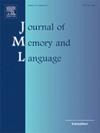Word learning in children with developmental language disorder: A meta-analysis testing the encoding hypothesis
IF 3
1区 心理学
Q1 LINGUISTICS
引用次数: 0
Abstract
Many children with Developmental Language Disorder (DLD) find learning new words difficult, which negatively affects their educational and psycho-social outcomes. Word learning involves encoding, consolidation and reconsolidation of words, but the most challenging phase and factors which moderate word learning remain unclear.
We conducted a systematic review and meta-analysis to determine which phase is most challenging and which factors predict oral word learning success in children with DLD. The search including PsycINFO, PubMed, Web of Science, and LLBA identified forty-six studies published before April 2024 comparing children with DLD and typically developing (TD) age-matched peers in word learning tasks. Seventy-eight effect sizes were calculated for encoding (n DLD = 1462, n TD = 2161), eight for consolidation (n DLD = 107, n TD = 112), and 19 for reconsolidation (n DLD = 296, n TD = 278).
The random effect model identified an effect for encoding (k = 78, d = 0.82, [0.66, 0.98], p < .001) but not consolidation (k = 8, d = −0.2, [−0.68, 0.29], p = .43) or reconsolidation (k = 19, d = 0.23, [−0.14, 0.59], p = .22) of new words. The moderator analysis via random effects models identified verbal short-term memory and lexical knowledge as significant moderators of encoding, while word length was the most important task characteristic.
Despite limited data for consolidation and reconsolidation, our findings provide new insights into oral word learning difficulties in children with DLD. These insights help clinicians and teachers identify support strategies while also highlighting gaps in existing research, driving future studies forward.
发展性语言障碍儿童的单词学习:一项检验编码假说的元分析
许多患有发展性语言障碍(DLD)的儿童发现学习新单词很困难,这对他们的教育和心理社会结果产生了负面影响。单词学习包括单词的编码、巩固和再巩固,但最具挑战性的阶段和调节单词学习的因素尚不清楚。我们进行了一项系统回顾和荟萃分析,以确定哪一阶段是最具挑战性的,哪些因素可以预测DLD儿童口语单词学习的成功。包括PsycINFO, PubMed, Web of Science和LLBA在内的搜索确定了2024年4月之前发表的46项研究,比较了DLD儿童和正常发育(TD)同龄儿童在单词学习任务中的表现。计算了编码的78个效应量(n DLD = 1462, n TD = 2161),整合的8个效应量(n DLD = 107, n TD = 112),再整合的19个效应量(n DLD = 296, n TD = 278)。随机效应模型确定了编码的影响(k = 78, d = 0.82, [0.66, 0.98], p <;措施)但不整合(k = 8 d =−0.2−0.68、0.29,p =点)或重新整合(d = 0.23 k = 19日,(−0.14,0.59),p = 22)的新单词。通过随机效应模型进行调节分析,发现言语短期记忆和词汇知识是编码的显著调节因子,而单词长度是最重要的任务特征。尽管巩固和再巩固的数据有限,但我们的研究结果为DLD儿童口语单词学习困难提供了新的见解。这些见解有助于临床医生和教师确定支持策略,同时也突出了现有研究中的差距,推动未来的研究向前发展。
本文章由计算机程序翻译,如有差异,请以英文原文为准。
求助全文
约1分钟内获得全文
求助全文
来源期刊
CiteScore
8.70
自引率
14.00%
发文量
49
审稿时长
12.7 weeks
期刊介绍:
Articles in the Journal of Memory and Language contribute to the formulation of scientific issues and theories in the areas of memory, language comprehension and production, and cognitive processes. Special emphasis is given to research articles that provide new theoretical insights based on a carefully laid empirical foundation. The journal generally favors articles that provide multiple experiments. In addition, significant theoretical papers without new experimental findings may be published.
The Journal of Memory and Language is a valuable tool for cognitive scientists, including psychologists, linguists, and others interested in memory and learning, language, reading, and speech.
Research Areas include:
• Topics that illuminate aspects of memory or language processing
• Linguistics
• Neuropsychology.

 求助内容:
求助内容: 应助结果提醒方式:
应助结果提醒方式:


